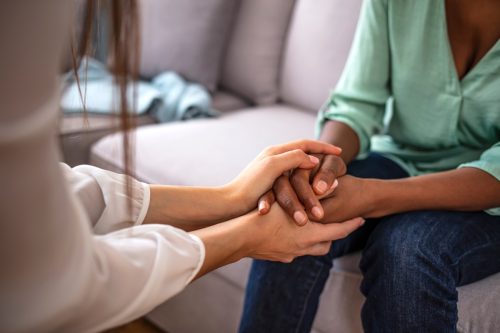How Long Does It Really Take to Fall in Love? Relationship Experts Weigh In

Starting a relationship is usually fun and exciting. But at some point, you might begin to question yourself and wonder if you’re really into your new significant other. This unsure feeling can cause a lot of stress—especially if think you should already know how you feel by now. But really, how long does it take to fall in love? With help from relationship experts, we were able to track down the timeline for this major relationship milestone. Read on to find out what research reveals about falling for someone.
READ THIS NEXT: The Top 5 Signs You Found the Love of Your Life, According to Relationship Experts.
Most people wait months to confess their feelings.

When it comes to reaching the “I love you” milestone in a relationship, there seems to be a consensus. A 2016 survey from Match.com found that the average person waits around 144 days or five months to drop the L-word. Earlier research indicated nearly the same timeframe—although the results varied slightly based on gender.
A 2011 study published in the Journal of Personality and Social Psychology determined that men and women differed in the amount of time it took for them to share their feelings. Male participants took an average of 97 days to say they were in love, while female participants reported taking longer to do the same at an average of nearly 139 days.
But you may be able to fall in love sooner than this.

We may wait months to say we’re in love—but according to research, we could be able to feel it much sooner than this. As part of a 2010 meta-analysis published in the Journal of Sexual Medicine, researchers said they found that falling in love only takes about a fifth of a second. When a person falls in love, 12 different areas of the brain work simultaneously to release chemicals that elicit eutrophic feelings, such as dopamine, oxytocin, adrenaline, and vasopression, according to the study.
A separate 2005 study found that levels of the protein nerve growth factor (NGF) are significantly higher in people who had just fallen in love. Stephanie Ortigue, PhD, the lead researcher for the 2010 study and a neuroscientist who previously worked as an assistant professor of psychology at Syracuse University, said these two findings give important context to the “love at fight sight” phenomenon. “These results confirm love has a scientific basis,” Ortigue said in a statement.
For more relationship advice delivered straight to your inbox, sign up for our daily newsletter.
Certain circumstances can affect how long it takes.

Research may show that you could fall in love within a second, but the timeline in which it actually takes seems to hardly be a one-size-fits-all scenario.
“It is important to understand that falling in love is a complex and multi-dimensional experience. It involves a combination of physiological, psychological, and social factors,” LaTonya P. Washington, LISCW, a licensed therapist and founder of Changing Seasons Therapy & Consulting, tells Best Life. “Given these complex factors, it is impossible to put an exact timeline on how long it takes to fall in love.”
According to Washington, certain circumstances can impact how long it takes different people to fall in love. “For example, one study found that individuals who met online tended to fall in love faster than those who met through more traditional means like mutual friends or work,” she explains. On the other hand, other factors may push people away from these feelings: “personal experiences and individual beliefs can also impact how people view the process of falling in love. For example, if someone has had a negative or traumatic experience in a past relationship, they may be more skeptical or guarded about falling in love again in the future,” Washington adds.
Experts advise against stressing over a specific timeline.

As a result of this uncertainty, experts recommend not tying your relationship to any exact expectations.
“It is important to remember that the timeline for falling in love can vary depending on the individual and the relationship,” says Kerry Lauders, a mental health officer at Startups Anonymous. “Some people may be able to form a strong emotional bond quickly, while others may take longer to develop a connection. Additionally, the amount of time two people have to get to know each other and build trust can also affect the timeline for falling in love.”
Washington confirms that there is no right or wrong time to fall in love. In fact, she says this milestone might not even be as important for couples as most commonly think it is. “Falling in love is not the same as building a healthy and sustainable relationship,” Washington says. “While the process of falling in love can be exciting and exhilarating, it is just the first step in a much longer journey. Building a strong and healthy relationship requires ongoing effort and the dedication of both partners.”
That means you and your partner both need to respect each other’s boundaries when it comes to being ready to say “I love you” to the other person, according to Washington. “Falling in love is a unique, personal experience, and it can take time to develop deep feelings for someone,” she explains. “Don’t feel like you have to rush the process or force yourself to feel anything that you don’t or may not be ready for.”